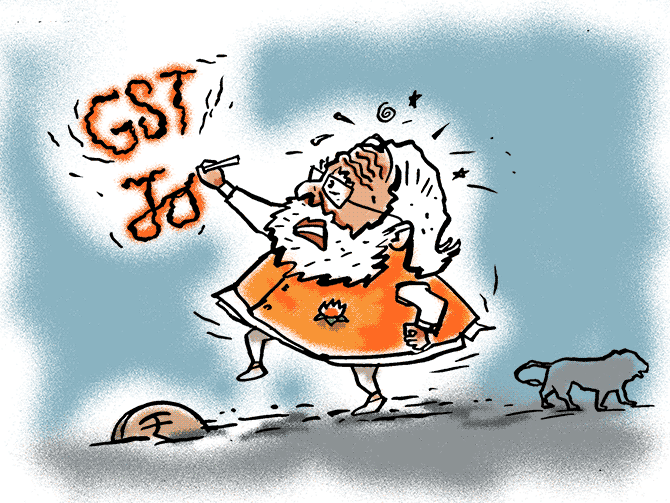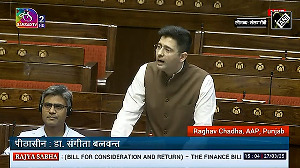Is it time to take a relook at our economic theories? asks Ajit Balakrishnan.
Illustration: Dominic Xavier/Rediff.com

If there is one thing that deep-thinking observers agree about the recently concluded state elections, it is that economic issues were dominant: Lack of enough jobs for young people entering the work force and small traders' angst over being forcibly pulled out of their comfortable cash-based economy (which they view not as modernity, as many of us do, but as being thrown at the mercy of bureaucrats administering goods and services tax or GST, income tax, and sundry other departments).
I can see media analysts, economic theorists and politicians are scratching their heads in bewilderment. On my part, when I get confronted with such bewilderment, I find myself wandering to my shelf of economic theory books to see what learned people make of all this.
Prominently staring at me from my bookshelf for the past few weeks is a book I have been dipping into: Raghavan Jagannathan's The Jobs Crisis in India. His conclusion (at the risk of oversimplifying a complex argument), after examining the jobs issue from many different angles, is that India's problem is not inadequate number of jobs but that there are not enough formal sector jobs, which he defines as a job with a minimum contractual period of three years and where the employer contributes to provident fund and health care insurance.
These jobs, he feels, are likely to be in small and medium enterprises in the apparel, tourism, construction, health care, and education sectors.
But, then, staring at me equally authoritatively is Siddhartha Sarkar's Theorising Informal Economy, a book I run to whenever a case is made against the informal economy.
He points out all the reasons for the existence and persistence of the informal sector in India: These entities, use manual/highly labour-intensive processes and operate outside the tax system to survive and even thrive by producing goods that are perhaps of lesser quality but more affordable for the Indian masses, or they provide services such as delivering fresh vegetables and fish or providing repair or gardening services.
The important thing about these enterprises, Mr Sarkar points out, is that are the main sources of employment for young folk coming away from distressed farms to cities.
Practically everyone in India looks to the real estate and construction sector as the path to salvation for our jobs woes, but there is a book that makes me wonder whether our national hope about real estate deserves a little circumspection: This is Landscapes of Accumulation: Real Estate and the Neoliberal Imagination in Contemporary India by Llerena Guiu Searle of the University of Rochester.
She describes the various interconnected players that form the chorus cheering on the real estate industry: Material producers (of cement and steel), professional service providers (architects, engineers, lawyers, accountants...), permit givers (government agencies, municipal authorities, politicians...), investors (individuals, Indian and foreign institutions), banks, aspirant home owners, and hold your breath, media companies (newspapers, magazines, TV, Radio) who look at real estate advertising as their main succour at a time when other advertiser segments have cut budgets.
She describes the stories that these groups circulate: 'Newspaper articles on real estate routinely refer to the nuclearisation of families, the decreasing age of home-buyers... new lifestyles [that] abound in soft features... on Western style corporate living...'
All this, she believes, has had the effect that 'India's cities are becoming ever more inaccessible to the country's poor.'
When economic issues look as bewildering as they do today in India, it might be a signal that our current way at looking at these issue needs a revision. Kaushik Basu's new book The Republic of Beliefs: A New Approach to Law and Economics provides one such new perspective.
Look at what is going on in the world as a game, he says. Like any game, you have a set of players, a set of actions each player has to choose from, and a payoff (or return) each player will get as a result of these moves.
The law in a country is then viewed as influencing what each player expects how other players to behave. For example, in the game of football, each player acts on the belief that all other players, except the two goalkeepers will never touch the ball with their hands.
Similarly, in economic life, the legislated laws have an impact through a similar effect on our beliefs; it allows us to guess how others in the game of life will behave.
Mr Basu discusses a case of resulting chaos when the government enacted laws to govern the relationship between farmers and those who lent money to these farmers and how the lenders stopped lending altogether.
No, we are not discussing the current chaos in the non-banking financial companies sector -- the case he describes is set in 1818, when the British, soon after their victory over the Marathas, were faced with riots in what was then called the Bombay Deccan and set up civil courts to ensure fair play between the moneylenders and the peasants, and they discovered that neither party used these courts very much.
'The [Maratha] kunbi peasant is the Marwari's moneylender's cow and is too valuable an animal to be allowed to perish' was the conclusion of the Deccan Riots Commission.
Mr Basu point is that if life is a game, given the choices that everybody else has made no individual will choose an action that will disturb the equilibrium.
As an example, if everyone chooses to drive on the left side of the road, it is in your interest to drive on the left even though you have the choice to drive on the right.
Thus, a law enacted to mandate driving on the left will get acceptance because it now allows us to predict how others will behave.
Do we need to relook at all our economic laws and actions from this perspective?
Ajit Balakrishnan, founder and CEO, Rediff.com, is the author of The Wave Rider, A Chronicle of the Information Age. You can reach him at ajitb@rediffmail.com











 © 2025
© 2025